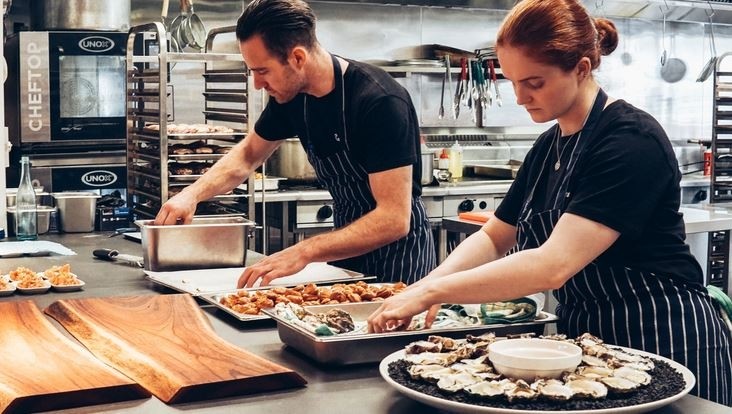How to Get a Chef Apprenticeship 101 – Everything You Need To Know!

Working as a chef is a highly skilled and practical career-path, and in the UK especially, the prospects for chefs right now have never been better.
Working within hospitality recruitment for over six years, we’ve kept a close eye on employment trends in the sector.
Currently there’s a shortage of skilled chefs, but the restaurant sector is booming, so there has never been a better time to bag yourself a chef apprenticeship and start building an awesome career.
What Skills Do I Need?
So you’re always at the forefront of the annual family BBQ, and consider yourself a dab hand at chopping vegetables, but do you have what it takes to handle the heat of a professional kitchen?
Cooking for fun and cooking for a living can often be two very different kettles of fish.
In order to succeed as a chef you need to possess a multitude of core skills, but being organised, hardworking and creative are perhaps the most pivotal.
However, above all else, the most important characteristics an aspiring chef must possess are a love and passion for astounding food.
If you have these, you are already well on your way to becoming the next master chef extraordinaire!
What Will I Be Doing?
As an apprentice chef you can expect to be undertaking a wide variety of jobs that include anything from preparing and cooking food, to garnishing, cleaning and even ordering supplies.
The overriding factor as an apprentice chef is that you will have a lot to learn, and so you will be actively encouraged to help out with all areas of the kitchen in order to develop a well-rounded skill-set.
Alongside the all-important practical element, you will be supported by day release when required – attending training courses that will supplement your learning.
This broad range of activities will also help you to decide what you want to specialise in once you’re fully qualified, as in a modern commercial kitchen there is no such thing as a ‘jack of all trades’, instead, there is a clear level of hierarchy with everyone having a different station specialising in a different part of the food production process.
There is a title (these are mostly French, obviously), and a level of prestige associated with each position - check out our guide to chef terms if you’re somewhat confused, as we’ll refer to these again later on!
How Long is a Chef Apprenticeship?
This all depends on the type of apprenticeship taken. Most apprenticeships take between 12-16 months to complete, whereas advanced apprenticeships are around 16-20 months.
How Will I be Assessed?
Vocational qualifications work by testing your abilities in the workplace, and are assessed in two main ways:
- By portfolio – you build up evidence of what you've done at work.
- By observation – an assessor watches you work and checks that you can do the tasks.
This is a distinct advantage over a culinary based degree, as reading about the 100 different ways you can cook an egg is very different from actually doing it!
With apprenticeships, you learn by doing, and thus you will already be familiar with the ins and outs of a professional kitchen by the time you’re qualified.
What Types of Apprenticeships are Available?
In England, there are 2 types of catering and professional chef apprenticeships available.
1) Intermediate Level Apprenticeship – you could train in roles to become a:
- School Chef.
- Commis Chef.
- Demi Chef de Partie.
2) Advanced Level Apprenticeship – you could train in roles to eventually become a:
- Chef de Partie.
- Sous Chef.
Whilst undertaking an advanced level apprenticeship, your employer may encourage you to take qualifications such as:
- Level 3 (NVQ) Diploma in Professional Cookery.
- Level 3 Award in Supervising Food Safety in Catering.
- Level 3 Diploma in Advanced Professional Cookery.
- Level 3 Diploma in Professional Patisserie and Confectionery.
- Level 3 (NVQ) Diploma in Hospitality Supervision and Leadership.
Some of these qualifications also allow you the option to specialise in particular types of regional cookery, such as Chinese or Thai.
What are the Entry Requirements for an Apprenticeship?
In England, anyone can become a chef apprentice as long as you meet the following criteria:
- You’re 16 or over.
- You’re eligible to work in the UK.
- You’re not in full-time education.
Some advanced apprenticeships require previous levels of NVQ qualifications, but for the most part no specific qualifications are required – there are also no age limits, which is perfect for those who are changing careers.
These requirements vary from country to country though, so you’ll need to check with your relevant governing body to be certain.
So, How Do I Get a Chef Apprenticeship?
Still think a chef apprenticeship is the right move for you? Then there are numerous resources available to you to help you find one.
The Government Apprenticeship Finder Service is a handy tool that allows you to search for specific apprenticeships and refine in terms of distance and qualifications needed – it even calculates your commuting time for you!
The Not Going To Uni (NGTU) site is also a great place to search for vacancies and apply online.
Targeted Hospitality Job Boards (ahem, us!) also regularly carry chef apprenticeship vacancies; you can take a look at the latest Pub Chef Jobs we have available here.
Our recruiter section is also a great place to identify employers within the industry.
Finally, if you’re feeling proactive you can always get in touch with restaurants in your local area, and see if they are keen to take on an apprentice.
If you’re well prepared and willing to put in the groundwork there’s every possibility you’ll find the perfect apprenticeship for you, and who knows, you could be their head chef in a few years!







